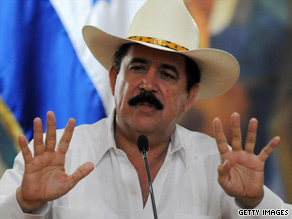
The president of the U.N. General Assembly scheduled a noon session Monday to discuss the situation in Honduras, following a military-led coup that ousted the sitting president.
Miguel d’Escoto Brockmann called the Honduran military’s intervention a “criminal action” and U.N. Secretary-General Ban Ki-moon in a statement condemned the removal of “the constitutional president.” Hours after President Jose Manuel Zelaya was deposed Sunday, Roberto Micheletti was sworn in. But the former president was not ready to give up his powers. The political developments that swept Honduras over the past weeks and led up to Sunday’s coup had the makings of a crisis, but the situation in the Central American nation of 8 million people was calm. Micheletti was sworn in as provisional president to the applause of members of Congress, who chanted, “Honduras! Honduras!” Outside the building, supporters of Zelaya protested, but their numbers were limited, and the streets remained mostly peaceful. Micheletti told CNN en Español Sunday evening that he had imposed an “indefinite” curfew. Micheletti, the head of Congress, became president after lawmakers voted by a show of hands to strip Zelaya of his powers, with a resolution stating that Zelaya “provoked confrontations and divisions” within the country. A letter of resignation purported to be from Zelaya was read to members before the vote. Watch details on “curious situation” in Honduras » But the deposed president, Zelaya, emphatically denied in an interview with CNN en Español that he wrote the letter. Speaking from Costa Rica, where he was taken after the coup, he said he plans to continue exercising his presidential duties with a trip to Managua, Nicaragua, to attend a summit of Central American heads-of-state. Zelaya awoke to the sound of gunfire in his residence and was still in his pajamas when the military forced him to leave the country Sunday morning, he told reporters. He was flown to Costa Rica, where he has not requested political asylum. “This was a brutal kidnapping of me with no justification,” Zelaya said. He called the coup an attack on Honduran democracy. “There are ways to protest without arms,” Zelaya said. The coup came on the same day that he had vowed to follow through with a nonbinding referendum that the Honduran Supreme Court had ruled illegal. The coup was widely criticized in the region, in strongest terms by Zelaya’s leftist allies, including Venezuelan President Hugo Chavez. A statement from Venezuela’s foreign ministry said Zelaya was “violently expelled from his country by a group of unpatriotic, coup-mongering soldiers.” The Bolivian government also condemned the coup, accusing Honduran troops of kidnapping Zelaya and violently expelling him from his country. Elsewhere, Jose Miguel Insulza, the secretary-general of the Organization of American States, strongly condemned the coup in a statement. And in Washington, U.S. President Barack Obama said in a statement that he was “deeply concerned” by the news. “I call on all political and social actors in Honduras to respect democratic norms, the rule of law and the tenets of the Inter-American Democratic Charter,” Obama said. “Any existing tensions and disputes must be resolved peacefully through dialogue free from any outside interference.” But in Honduras, the Supreme Court said in an official statement that the military was acting in accordance with a court order to put an end to Sunday’s scheduled vote, which the court’s justices had found illegal. Micheletti addressed the issue in his first remarks as provisional president.
Don’t Miss
Zelaya challenges gov’t over referendum
iReport.com: Share your stories, videos from Honduras
“I did not reach this position because of a coup,” he said. “I am here because of an absolutely legal transition process.” No other countries immediately recognized Micheletti as president. Zelaya, a leftist elected in 2005, had found himself pitted against the other branches of government and military leaders over the issue of Sunday’s planned referendum. It would have asked voters to place a measure on November’s ballot allowing the formation of a constitutional assembly that could modify the nation’s charter to allow the president to run for another term. In various interviews Sunday, Zelaya characterized the vote not as a referendum, but as a survey to gauge receptiveness toward a constitutional assembly. He denied that he would have been the beneficiary of any future constitutional changes. Zelaya, whose four-year term ends in January 2010, cannot run for re-election under current law. The Honduran Supreme Court had ruled the poll illegal, and Congress and the top military brass agreed, but Zelaya had remained steadfast. In the end, it appeared the opposition to Zelaya was too great. The military confiscated the ballots from the presidential residence, in effect canceling the disputed vote. In separate appearances Sunday, Zelaya, Venezuela’s Chavez and Cuban Foreign Minister Bruno Rodriguez said that the military had also detained Honduran Foreign Minister Patricia Rodas, further raising regional tensions.
Speaking in Havana, Rodriguez said the Cuban, Nicaraguan and Venezuelan ambassadors to Honduras had tried but were unable to protect Rodas from a group of masked soldiers who forcibly took her from their grasp. Further details regarding that incident were unclear. “If they attack our ambassadors, they will be declaring a state of war,” Chavez said. “If they have weapons, then we have weapons, too.”